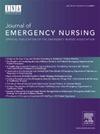Impact of COVID-19 on Selected Nurse and Patient Outcomes in Emergency Units Across South Africa
IF 2.3
4区 医学
Q2 EMERGENCY MEDICINE
引用次数: 0
Abstract
Introduction
Worldwide, emergency nurses experience worse nurse outcomes (burnout, physical and mental health, compassion fatigue, and job and career satisfaction), further exacerbated by the coronavirus disease 2019 pandemic, although poorly reported in developing countries. Therefore, this study aimed to determine the pandemic’s impact on nurse and patient outcomes in emergency units in South Africa.
Methods
A cross-sectional correlational design was used, with data collected from 2 different groups in the public and private sectors after the second and third coronavirus disease 2019 waves using a questionnaire. Purposive sampling of 116 private sector and 27 public sector emergency units (total n = 143) and total population sampling of nurses (n = 332) were used.
Results
South African emergency nurses experienced high levels of emotional exhaustion (mean = 28.03; SD = 1.08) and moderate job satisfaction (mean = 2.81; SD = 0.07), being particularly dissatisfied with salary/wages (mean = 2.15; SD = 0.07). More than a quarter (25.30%) planned to quit their jobs. Participants rated patient safety positively (mean = 2.32; SD = 0.09). Nurses responding after the third wave of the pandemic reported higher rates of compassion fatigue (odds ratio, 3.2; 95% CI, 1.01-10.1; P = .047) and dissatisfaction with both professional status (odds ratio, 2.23; 95% CI, 1.13-4.40; P = .02) and independence at work (odds ratio, 2.21; 95% CI, 1.24-3.94; P = .047, P = .01). There were practically significant correlations between job satisfaction and recommending one’s workplace (r = −0.44; P < .001) and emotional exhaustion and confidence in postdischarge care (r = 0.40; P < .001).
Discussion
An association between coronavirus disease 2019 and nurse and patient outcomes in South African emergency units exists, highlighting emotional exhaustion, compassion fatigue, and job dissatisfaction concerns. Significant correlations were identified between nurse and nurse-reported patient outcomes. Addressing these concerns is critical to achieving better outcomes and planning for future health emergencies.
2019冠状病毒病对南非急诊部门部分护士和患者预后的影响
导言:在世界范围内,急诊护士的护理结果更差(倦怠、身心健康、同情疲劳、工作和职业满意度),2019年冠状病毒病大流行进一步加剧了这种情况,尽管发展中国家的报告很少。因此,本研究旨在确定大流行对南非急诊科护士和患者预后的影响。方法:采用横断面相关设计,采用问卷调查的方式收集2019年第二波和第三波冠状病毒病后公共和私营部门2个不同群体的数据。目的抽样116个私营部门和27个公共部门急诊单位(n = 143)和护士总人口抽样(n = 332)。结果:南非急诊护士经历了高水平的情绪衰竭(平均= 28.03;SD = 1.08)和中等工作满意度(mean = 2.81;SD = 0.07),对薪水/工资特别不满意(均值= 2.15;Sd = 0.07)。超过四分之一(25.30%)的人计划辞职。参与者积极评价患者安全性(平均= 2.32;Sd = 0.09)。在第三波大流行之后做出反应的护士报告了更高的同情疲劳率(优势比为3.2;95% ci, 1.01-10.1;P = 0.047)和对职业状况的不满意(优势比,2.23;95% ci, 1.13-4.40;P = .02)和工作独立性(优势比,2.21;95% ci, 1.24-3.94;P = 0.047, P = 0.01)。工作满意度与推荐工作场所之间存在显著相关(r = -0.44;P < 0.001)、情绪衰竭和出院后护理的信心(r = 0.40;P < 0.001)。讨论:2019冠状病毒病与南非急诊部门护士和患者预后之间存在关联,突出了情绪衰竭、同情疲劳和对工作不满的担忧。在护士和护士报告的病人结果之间发现了显著的相关性。解决这些问题对于取得更好的成果和规划未来的突发卫生事件至关重要。
本文章由计算机程序翻译,如有差异,请以英文原文为准。
求助全文
约1分钟内获得全文
求助全文
来源期刊
CiteScore
3.10
自引率
11.80%
发文量
132
审稿时长
46 days
期刊介绍:
The Journal of Emergency Nursing, the official journal of the Emergency Nurses Association (ENA), is committed to the dissemination of high quality, peer-reviewed manuscripts relevant to all areas of emergency nursing practice across the lifespan. Journal content includes clinical topics, integrative or systematic literature reviews, research, and practice improvement initiatives that provide emergency nurses globally with implications for translation of new knowledge into practice.
The Journal also includes focused sections such as case studies, pharmacology/toxicology, injury prevention, trauma, triage, quality and safety, pediatrics and geriatrics.
The Journal aims to mirror the goal of ENA to promote: community, governance and leadership, knowledge, quality and safety, and advocacy.

 求助内容:
求助内容: 应助结果提醒方式:
应助结果提醒方式:


